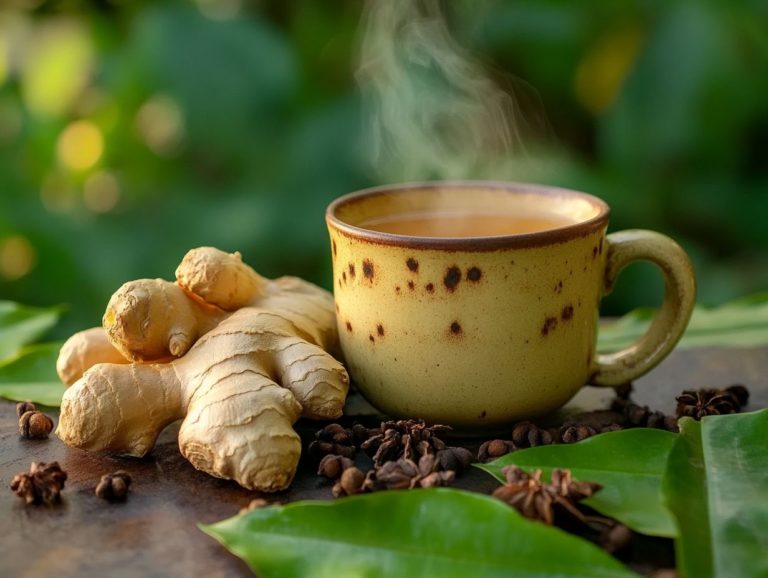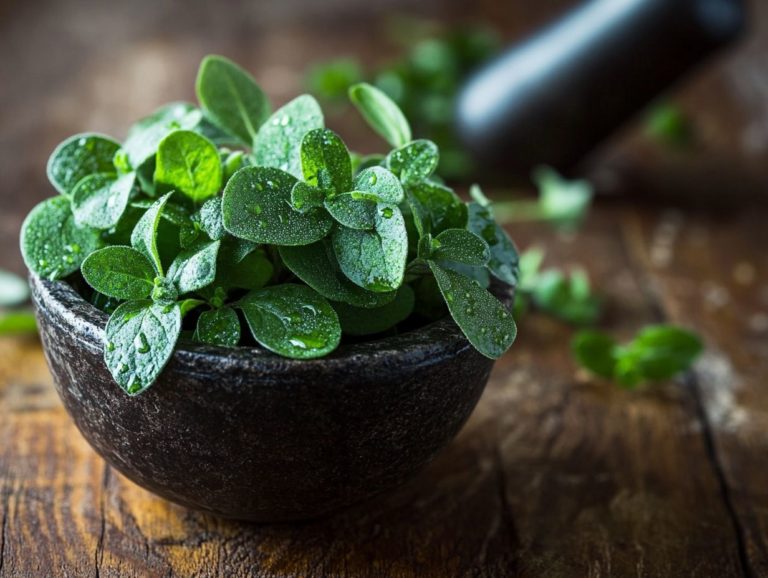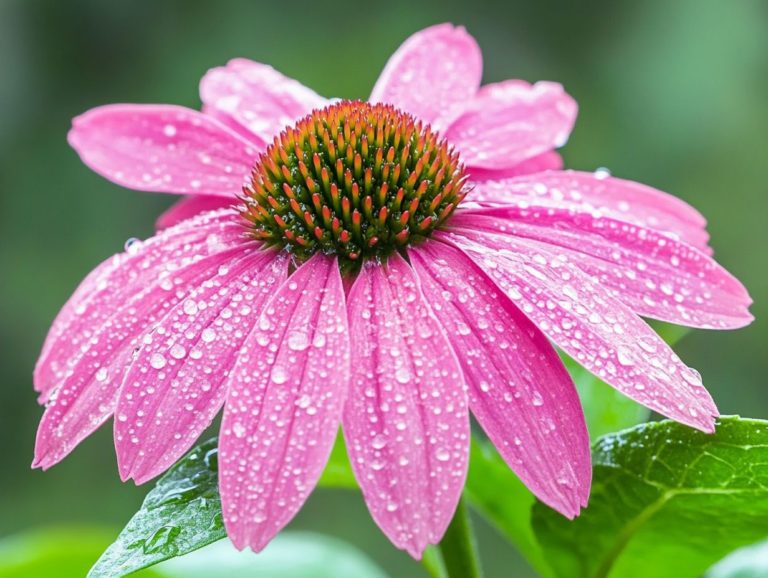The Therapeutic Uses of Passionflower
Passionflower, a breathtaking vine adorned with intricate blooms, has long captured attention and imagination.
This botanical marvel was once cherished by Indigenous cultures for its soothing qualities, seamlessly weaving itself into contemporary wellness practices.
This article explores the rich history and traditional uses of Passionflower. We will uncover its emerging therapeutic benefits backed by research and offer practical tips for incorporating it into your daily routine.
Don t miss the essential precautions you need to know for safe use, along with the importance of consulting healthcare professionals highlighted throughout.
Whether you’re seeking relaxation or natural remedies, Passionflower might just hold the key to your wellness journey.
Contents
- Key Takeaways:
- What is Passionflower?
- Traditional Uses of Passionflower
- Modern Therapeutic Uses
- How to Use Passionflower
- Possible Side Effects and Interactions
- Consulting with a Healthcare Professional
- When and How to Seek Medical Advice
- Frequently Asked Questions
- What are the therapeutic uses of Passionflower?
- How does Passionflower work as a therapeutic herb?
- Can Passionflower be used to treat insomnia?
- Are there any other medical uses for Passionflower?
- Is Passionflower safe to use as a therapeutic herb?
- How is Passionflower typically consumed for therapeutic purposes?
Key Takeaways:
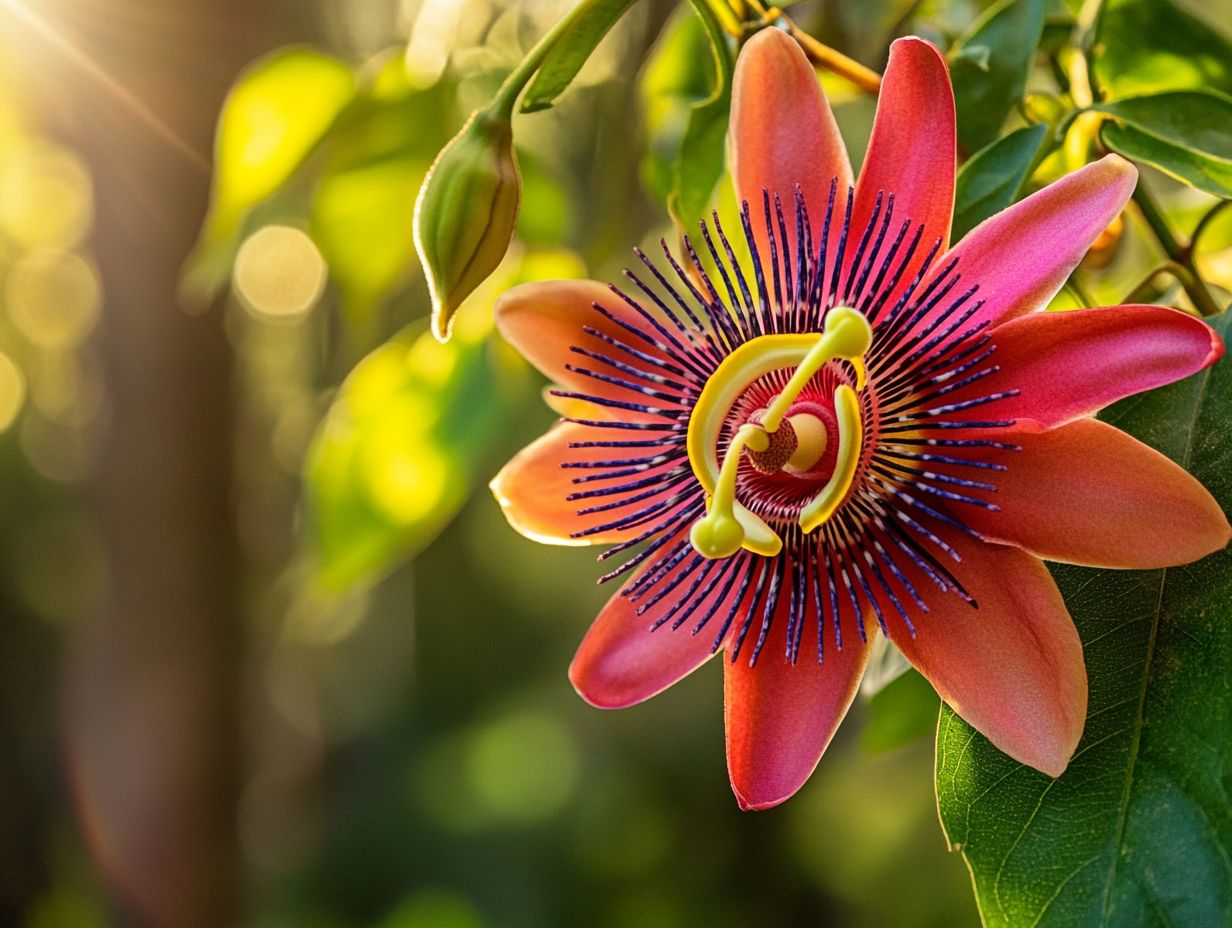
- Passionflower has a long history of traditional use for medicinal and cultural purposes.
- Modern research shows Passionflower has therapeutic benefits, especially for anxiety and sleep disorders.
- Before using Passionflower, it is important to consult with a healthcare professional and follow recommended forms and dosages to avoid potential side effects and interactions.
What is Passionflower?
Passionflower, or Passiflora incarnata, is a distinguished herbal remedy revered for its remarkable potential in alleviating anxiety and promoting restful sleep.
This plant has a rich history, having been cherished by Native Americans for its soothing effects. Its extracts are often featured in a variety of relaxation aids, celebrated for combating insomnia and addressing various nervous disorders.
Overview and History
The historical context of Passionflower reveals its profound significance among Indigenous peoples, who embraced it as a traditional remedy for a range of ailments.
This stunning vine was cherished not only for its medicinal properties but also for its symbolic role in many cultures, representing harmony and tranquility.
Various tribes incorporated it into rituals and healing practices, believing it could restore balance within spirit and body. As modern herbal medicine gained traction, the use of Passionflower expanded, earning recognition as an effective natural remedy for insomnia and anxiety.
Today, you can find it in various forms teas, tinctures, and capsules offering a connection between ancient wisdom and contemporary health practices.
Traditional Uses of Passionflower
Traditionally, Passionflower has been revered as a powerful herbal remedy for alleviating anxiety and addressing sleep disturbances, including insomnia, thanks to its remarkable calming properties.
Medicinal and Cultural Applications
The cultural applications of Passionflower extend beyond mere anxiety relief. It has gained recognition for its effectiveness in treating depression and other nervous disorders.
This remarkable herb, scientifically known as Passiflora incarnata, has a rich history in traditional medicine, utilized by Indigenous peoples and herbal practitioners for centuries.
Renowned for its calming effects, many individuals have turned to Passionflower as a natural remedy to soothe restless minds and restore emotional balance.
In contemporary herbal medicine, it is frequently blended with other calming herbs to enhance its effects, highlighting its importance in natural health methods.
Those seeking alternatives to conventional pharmaceuticals often report experiencing reduced symptoms of anxiety and depression, reinforcing the herb’s invaluable role in historical and modern wellness regimens.
Modern Therapeutic Uses

In contemporary therapeutic practices, Passionflower is emerging as a noteworthy option for alleviating anxiety and treating insomnia.
This resurgence is backed by robust evidence from research studies, underscoring its potential benefits in promoting mental well-being.
Explore Passionflower products and consult a healthcare provider for personalized advice on how to incorporate this natural remedy into your routine!
Research and Evidence-Based Benefits
Numerous studies have explored the remarkable benefits of Passionflower, particularly its effectiveness in alleviating anxiety and treating insomnia.
This provides robust evidence that underscores its potential.
One notable study published in the Journal of Clinical Psychology utilized a randomized controlled trial design to evaluate the effects of Passionflower extract on individuals diagnosed with generalized anxiety disorder. The results were striking: participants who took the extract reported significantly lower anxiety levels compared to those in the placebo group.
Another compelling study in the journal Phytotherapy Research showcased how combining Passionflower with other herbal remedies significantly improved sleep quality for those grappling with sleep disorders.
These investigations employed various methodologies, including studies where neither the participants nor the researchers knew who got the treatment and self-report questionnaires, to ensure the reliability of their findings. This rigorous approach further affirms Passionflower s promise as a natural solution for managing anxiety and enhancing sleep quality.
How to Use Passionflower
When considering Passionflower as an herbal supplement, you have a range of options at your disposal. Whether you prefer the soothing embrace of a tea, the convenience of capsules, or the concentrated potency of extract tinctures, each method presents unique benefits tailored to your needs, influenced by both dosage and preparation technique.
Forms and Dosages
Passionflower comes in various forms, including herbal teas, capsules, and extract tinctures, catering to your diverse preferences seamlessly.
Each option presents its own preparation methods and effects. Herbal teas are made by steeping dried leaves and flowers in hot water, offering a calming aroma and a delicate, floral flavor that many find truly soothing.
Capsules provide a more concentrated dosage, perfect for those who appreciate convenience without the fuss of preparation. Meanwhile, extract tinctures, derived by soaking the plant in alcohol, deliver a potent solution that you can easily mix with water or take directly.
When you consider effectiveness, tinctures often provide quicker relief, while teas offer a gentle, gradual soothing experience. Make sure to follow the recommended dosages for the best results:
- For teas, aim for one to two cups daily.
- For capsules, the typical range is 250-500 mg.
- For tinctures, try 20-30 drops in water, adjusting based on your individual response.
Possible Side Effects and Interactions
While Passionflower is typically regarded as safe, it’s important to be aware of potential side effects, such as dizziness and confusion, especially when it interacts with other medications.
Precautions and Warnings
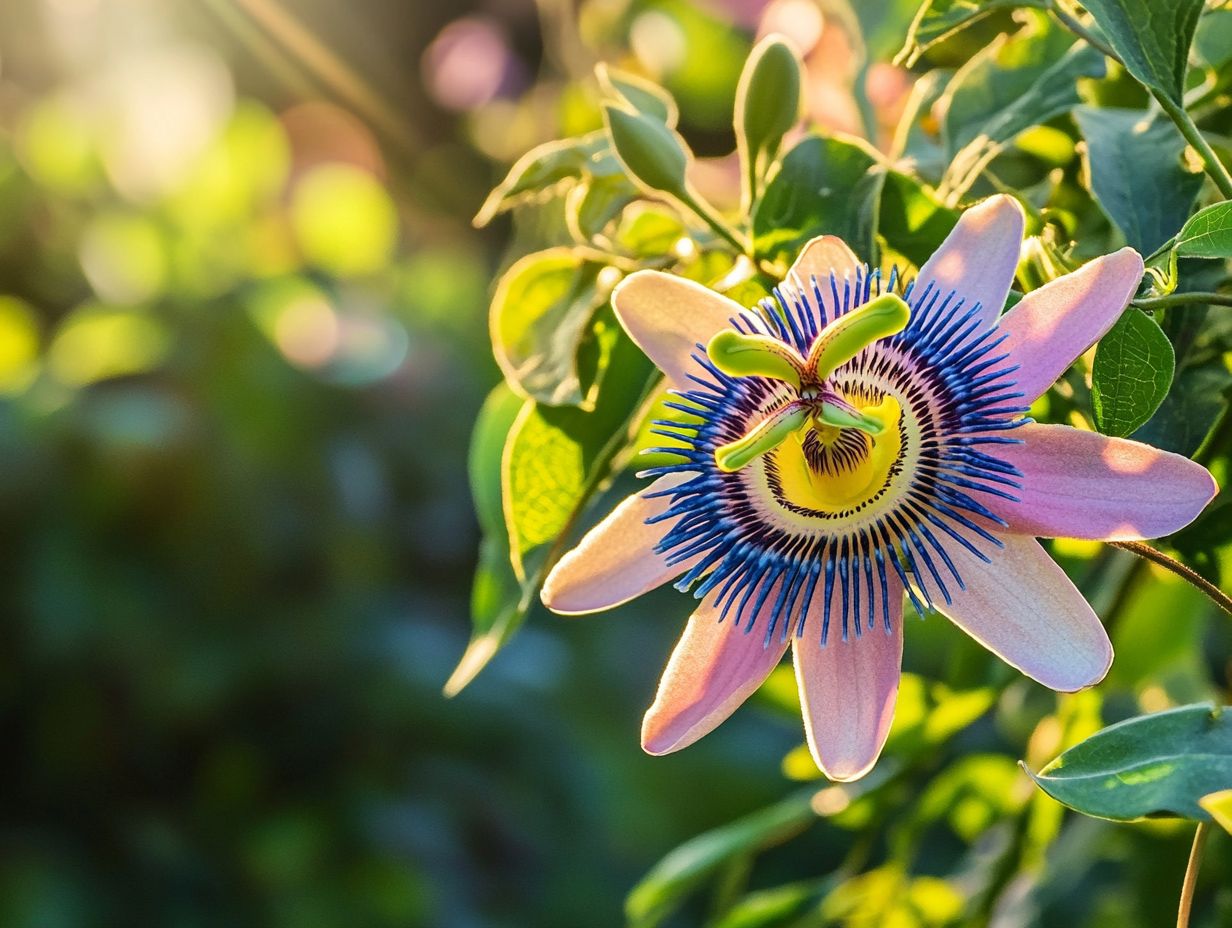
When considering the use of Passionflower, it s crucial for you to be aware of potential side effects and drug interactions that could impact your safety and overall health.
Pay particular attention to the risk of interactions with sedative medications. This herb can enhance the effects of drugs like benzodiazepines and pentobarbital, which may lead to excessive drowsiness or even complications with breathing.
If you re currently taking these medications, it s wise to discuss Passionflower with your healthcare provider before incorporating it into your routine. If you have liver conditions or are scheduled for surgery, proceed with caution, as Passionflower can influence liver metabolism and extend sedation.
Such thoughtful consideration can ensure that natural remedies enhance your well-being rather than compromise it.
Consulting with a Healthcare Professional
Consulting with a healthcare professional before adding Passionflower to your routine is essential. This step ensures your safety and allows you to address any potential health concerns effectively.
When and How to Seek Medical Advice
Understanding when and how to seek medical advice about Passionflower can greatly affect your health.
If you’re considering Passionflower during pregnancy, consult a healthcare professional to ensure it s safe for you and your baby.
If you experience side effects like dizziness, nausea, or unusual fatigue while using this herb, reach out to a trusted medical advisor.
Engaging with a qualified healthcare provider helps manage these symptoms and provides guidance on dosage and potential interactions.
By taking these proactive steps, you can confidently navigate the complexities of herbal supplements!
Frequently Asked Questions
What are the therapeutic uses of Passionflower?
Passionflower is traditionally used for its calming and sedative effects. It is a popular remedy for anxiety, insomnia, and nervous disorders.
How does Passionflower work as a therapeutic herb?

Passionflower contains compounds that bind to specific brain receptors. This results in sedation and helps reduce feelings of anxiety and stress.
Can Passionflower be used to treat insomnia?
Yes! Passionflower has been studied for its ability to improve sleep quality and reduce insomnia symptoms. It offers a natural alternative to sedative medications.
Are there any other medical uses for Passionflower?
Besides calming effects, Passionflower is used for conditions like ADHD, menopausal symptoms, seasonal allergies, and gastrointestinal issues.
Is Passionflower safe to use as a therapeutic herb?
Passionflower is generally safe for most people when taken as directed. However, it may interact with certain medications, such as benzodiazepines, causing dizziness and confusion. Always consult a healthcare professional before use.
How is Passionflower typically consumed for therapeutic purposes?
Passionflower can be taken as teas, tinctures, capsules, or extracts. It s often combined with other herbs, like chamomile and St. John’s Wort, for enhanced effects.

